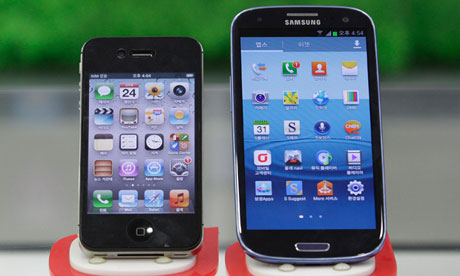 |
| Apple and Samsung Phones |
The target would be the Android operating system, or at least any "infringing" Android software that stepped into Apple territory.
Oracle already tried this (see "Google's Waterloo, US Patent 6,061,520" I wrote in May). I thought it would be Google's downfall as it was a straightforward case of copying. And while the court agreed the damages were set to zero - so in the end I was wrong.
So to me Apple would have a tough, up-hill battle.
Another point: Google does not sell Android software. It gives it away free.
So it will be hard for Apple to directly claim that Google's software is damaging Apple's business.
Today's Samsung phones don't even have the features Apple sued over so the industry is still very nimble when reacting to patent law.
So in the end I think that things will shake out for a while more and then it will be over.
Kodak, for example, with its supposedly valuable trove of patents, was passed by both Google and Apple. So they must feel that a weakened Kodak won't be able to mount an offense against either of them with regard to its imaging patent portfolio.
At the end of the day you have to believe that the market for "smart phones" is bounded by a couple of things: 3G/4G data access, basic consumer finances, the replacement of home PC's and cable with phones and Netflix, things like that.
So as the phone industry expands it now starts to eat away at the basic infrastructure that built it - home internet and home computers.
Why have an expensive home computer when your phone does everything it does?
There is a good argument for this today - especially with tablet computers. As more Zynga games move to tablets home computers will simply die off in most cases as obsolete.
Similarly for internet access.
The only reason for most homes to have it is that it provides an easy access to Netflix or DirecTV download services.
Broadband cable is still expensive - about $70 USD per month for the minimum package where I live.
Its not hard to imagine that eventually this will be taken over by some form of wireless.
But here I don't see it happening right away.
There's a lot of bandwidth in a cable signal. A lot more than packet-switched cellphone towers are likely to be able to deliver any time soon.
Plus wireless phone bandwidth is still expensive.
So this will change, but more slowly, at least in rural areas.
In cities where someone, like Google, can install free Wifi this will be a game changer. Cable will simply go away.
Why pay for it at $70 or more USD per month when you can have Netflix for $8 USD (at least according to the advertising beaver).
Phones are the next home computers and all these patent wars are just part of the paradigm shift.
Just like anything else - black and white TV to color, simple razors to blade razors, and so on.
Smart phones are the current "Big Thing" - but the next "big thing" is out there - lurking in the bushes - waiting for Apple's time to be over.
What it is no one knows...
No comments:
Post a Comment